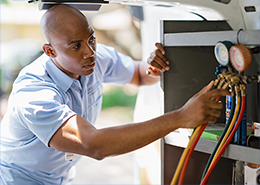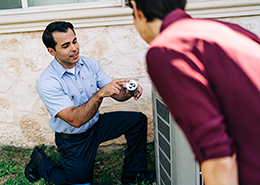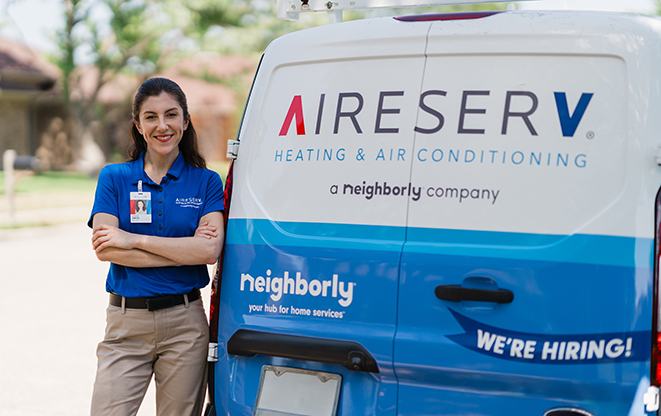Shopping for an air conditioning replacement is not as straightforward as picking up some bread and milk at the grocery store. Even if you know how many square feet your home is, there is still a lot to consider. From different styles, sizes, outputs, or configurations, so it can be difficult to determine which one is the perfect option for your home and the unique needs of your household. That's why it's a good idea to get your Aire Serv HVAC service professional to audit your home and give you some expert advice on the ideal Rockwall AC replacement system.
Legal Requirements for AC Energy Efficiency
When looking for a new Rockwall AC replacement, it's really important to focus on energy efficiency. A system with lower energy usage is kinder to the environment and will increase your energy savings. But did you know there are also minimum energy efficiency requirements determined by the U.S. Department of Energy?
The efficiency requirements are measured by the SEER rating, which is HVAC terminology that stands for seasonal energy efficiency ratio. At the beginning of 2015, new units installed in the Southeastern region of the United States (including Texas) were required to have a minimum SEER rating of 14. As of 2023, the requirement has increased to 15 SEER. HVAC system service professionals cannot legally install a new system with a lower SEER. These energy conservation standards help to reduce energy consumption throughout the region, which reduces the strain on resources. Our U.S. Environmental Protection Agency as well as the U.S. Department of Energy jointly run the Energy Star program, which certifies products such as air conditioners that meet certain standards of energy-efficient operation.
Types of Air Conditioner Systems We Replace
Taking into account the square footage of your home, there are a wide range of brands, styles, and configurations available for Rockwall AC replacement, but they generally fall into four categories:
- Split System & Package ACs: As standard central air conditioning systems, these two both use ductwork for air circulation. A package combines the AC unit with a heating system, while a split system has separate indoor units and outdoor units for cooling and heating.
- Ductless Mini-Splits: Don't have ductwork installed? No problem—as the name suggests, this type doesn't need air ducts to function. Instead, small wall-mounted evaporator units in each room link up to an outdoor condenser unit.
- Portable, Wall & Window Units: These self-contained, ductless units don't need an outdoor compressor and are easy to install or remove, so they're good temporary solutions for renters, but they aren't going to be able to efficiently cool an entire house.
- Evaporative Coolers: Also commonly known as swamp coolers, these AC units use evaporation to remove heat so they work most efficiently in climates with dry heat.
Plus, other considerations to take into account are two-stage cooling and one-stage cooling systems, depending on the needs of your home and what comfort level and efficiency rating you are looking to reach.
Climate and Humidity
The local climate and humidity levels in Rockwall should be another big consideration when choosing the best Rockwall AC replacement option for your home. The humidity and average temperatures of our climate make a big difference in the type, size, and price of the unit that will be effective in your home. Getting a smaller, weaker unit designed for colder climates just isn't going to get the job done in Texas, and you'll find yourself uncomfortable and looking into yet another replacement in the near future. Plus, taking into account the control panel or smart thermostat, which will help keep a regular cool temperature throughout the day.
Unlike West Texas, the Dallas-Fort Worth area gets quite a bit of humid air and precipitation blowing in from the Gulf. Because the average humidity in Rockwall is around 60 to 70 percent, evaporative coolers are not going to be a great choice for this area. They'll work for some of the year but won't be able to effectively remove moisture from your home in the more humid months.
With proper maintenance, regular air duct cleaning, and addressing repairs in a timely fashion, you can extend the lifespan of your unit.







